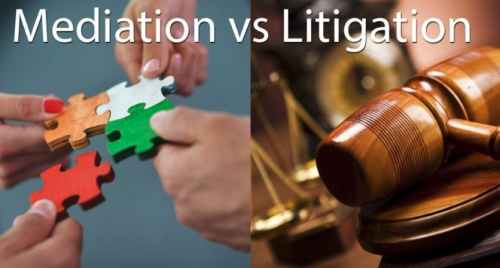The choice between mediation and litigation depends on the specific circumstances of the case, the willingness of the parties to cooperate, the complexity of the issues involved, and individual preferences. In situations where preserving relationships, maintaining privacy, and adhering to Islamic principles are priorities, Muslim divorce mediation may be a more suitable option. However, if legal adjudication, formal court processes, and the enforcement of legal rights are deemed necessary, divorce litigation may be the preferred route.
Is Divorce Mediation the Right Choice?
While Muslim divorce mediation can be a constructive and effective option for many couples, there are situations where it may not be the most appropriate choice. Here are some scenarios where mediation might not be suitable:
- Domestic Violence or Abuse:
-
- If there is a history or ongoing presence of domestic violence or abuse, mediation may not be safe or appropriate. In such cases, the safety of individuals involved is the primary concern, and legal avenues for protection may be more appropriate.
- Power Imbalance:
-
- When there is a significant power imbalance between the parties, such as one party exerting undue control or intimidation over the other, mediation may not provide a fair and equitable platform for negotiation.
- Lack of Willingness to Cooperate:
-
- If one or both parties are unwilling to engage in open communication or cooperate in the mediation process, achieving a mutually agreeable resolution may be challenging.
- Complex Financial Situations:
-
- In cases involving complex financial issues, extensive assets, or intricate financial arrangements, traditional legal processes may be more appropriate to ensure a thorough examination of financial matters.
- Refusal to Comply with Agreements:
-
- If there is a history of non-compliance with agreements or a lack of trust between the parties, mediation may not be effective in ensuring that the agreed-upon terms are followed.
- Mental Health Issues:
-
- In situations where one or both parties have severe mental health issues that impact their ability to participate effectively in mediation, alternative forms of support and intervention may be necessary.
- Imminent Legal Action:
-
- If legal action has already been initiated, or if there is a high likelihood that one party will resort to litigation despite mediation efforts, pursuing mediation may not be practical.
- Child Safety Concerns:
-
- If there are serious concerns about the safety and well-being of children involved, and mediation may not adequately address these concerns, a legal process with a focus on child protection may be more appropriate.
- Unavailability of Key Information:
-
- If there is a lack of transparency or unwillingness to disclose essential information related to financial matters or other relevant aspects, mediation may face obstacles in achieving a fair and comprehensive resolution.
- Court-Mandated Situations:
-
- In situations where mediation is not voluntary, such as when it is mandated by the court, but one or both parties are unwilling to actively participate, the effectiveness of the mediation process may be compromised.
It’s essential to carefully assess the specific circumstances of each case and consult with legal and mediation professionals to determine the most appropriate course of action based on the unique needs and challenges present.

